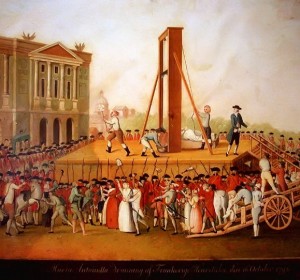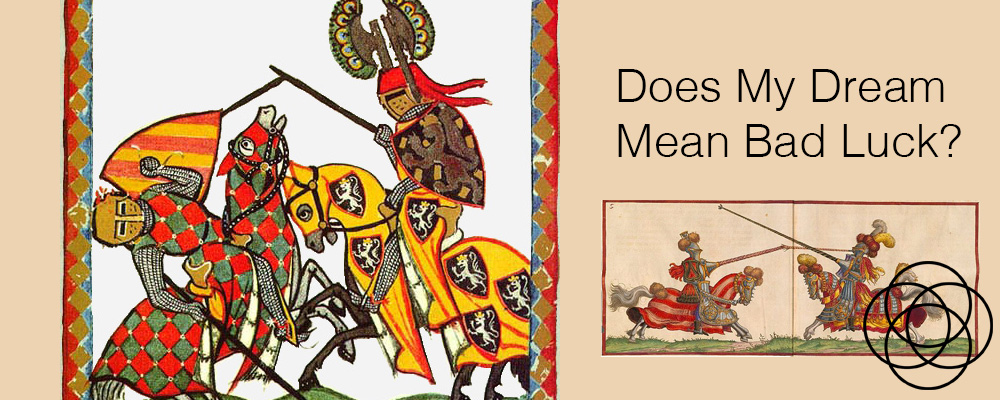“I dreamed I was jousting on horseback, and my opponent stabbed me in the chest with his lance,” said Mike, who called the PowerPack Breakfast show last week to ask me about his dream. “I fell out of bed with the impact,” he laughed. “What does it mean? Am I going to have bad luck?
As Mike was telling me about his dream, I was reminded of Alfred Maury, a 19th century French scholar and physician who famously dreamed that he was caught up in the French Revolution. The dream was long and complex, and in the closing sequence he was led to the guillotine to be executed. He heard the blade coming down, felt it touch the back of his neck, and saw his head roll … and at that exact moment the headboard of his bed came crashing down onto the back of his neck and woke him up. On the basis of this experience, Maury argued that dreams are instantaneous, and often related to external stimuli. He believed the pain of the headboard hitting his neck created the whole dream in a flash.

Alfred Maury believed the pain of the headboard hitting his neck created the whole guillotine dream in a flash. (It is now known that dreams occur in real time.)
His theory about dreams being instantaneous has since been disproved. Dreams are known to occur in real time. You may dream that you fly to the moon, but think of your dreams as using similar techniques as movies, capturing the story and feeling of a long journey in several minutes of cleverly cut footage.
Mike wasn’t pushed out of bed by an errant bedpost, or – as far as we know – by an elbow in the chest from his wife, or by a sudden internal painful sensation such as heartburn or panic, although external stimuli can and do work their way into the dream already in progress. No, Mike’s dream was symbolic, and the reason he fell out of bed when the dream lance plunged into his chest was most likely because the shock began to wake up his physical body. Usually, when we sleep, our motor nerves are inhibited to prevent us from moving and acting out our dreams. As we begin to wake up, we break through this REM atonia and our mobility returns.
Let’s get back to the aspect of dreams that I find compelling and interesting: why did Mike have his dream, and what does it mean?
Mike and his wife live near a castle, and they had attended a medieval re-enactment jousting tournament the day before the dream, but they had been to the same event in previous years, so why dream about it this time, and why such a dramatic dream?
Dreams process our conscious and unconscious experiences of the previous 24-48 hours, particularly anything that’s emotionally charged – excuse the pun. This year, there was something about the jousting that resonated at a deeper emotional level within Mike. It struck a chord, and his dreaming mind got to work on it.
“How did you feel in the dream?” I asked Mike.
His humour kicked in. “Like I was at the pointy end of the stick.”
His unconscious mind had spoken loud and clear. “In the day or two before the dream, was there a situation where you felt you were at the pointy end of the stick?” I asked.
Dreams – especially for those blessed with a sense of verbal humour, or who enjoy word play – often portray visual clichés. Look for them in dreams. Giggle, and be enlightened.
We only had a few minutes to talk about his dream, as this was breakfast radio.
“Does my dream mean bad luck?” asked Mike, no doubt picturing more of that pointy-end-of-the-stick feeling in days to come.
No. It’s not the job of dreams to preview good or bad luck. A dream’s job is to process our experiences, compare them to our past experiences and beliefs about life, and update our beliefs accordingly. A dream’s job is to help us make sense of our world, based on our personal experiences.
Mike’s job is to understand what his dream reveals about his mindset and decide whether that mindset is going to serve him well. How does he normally respond when he feels like he’s on the pointy end of a stick in life? Does he fight back, defend himself, go into attack mode, or withdraw into his armour? How do these responses work for him? Why does he respond in these ways? Why does he feel vulnerable? Might there be better ways to handle conflict, like negotiation or a heart to heart talk, depending on the circumstances? If we’d had an hour to explore his dream and his life, we would have found answers to these questions,we would have discovered insights, and solutions, and we would have applied dream alchemy to reprogram his mindset if required.
Whether you see life as dealing you good or bad luck, it’s how you respond and handle it that makes a difference. “Your dream can help you understand how you deal with conflict,” I said to Mike, “and find ways that get better results all round.”
Mike’s humour kicked in again, “My wife doesn’t fancy me wearing armour.” Now that’s a good thought to take forward. maybe an open-hearted approach is called for.

